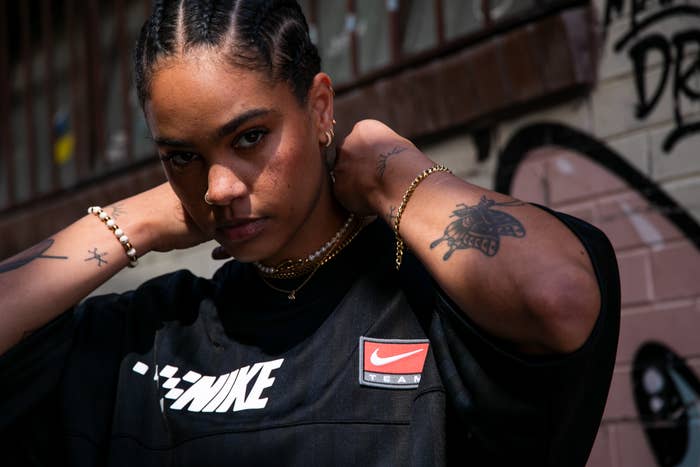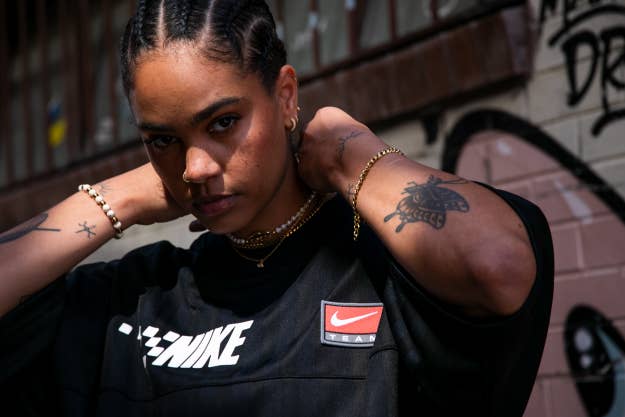
It was 2017 when Auckland’s JessB played her first festival. It was in her home country, New Zealand, at one of the country's biggest festivals, Northern Bass.
At the beginning of her career playing a festival set—particularly at Northern Bass—was the ultimate goal. She released her debut single, "Soul Free," at the start of June 2017. By the end of that month, she was announced on the lineup.
“Initially I had one of the opening slots, I think my set was at 1pm,” JessB told Complex Australia. “But then there was an artist on the first night, I think it was Princess Nokia, who couldn't perform anymore. So then I got asked if I wanted to take her slot alongside Rubi Du."
The slot was an 8pm one. Keep in mind, Stormzy and Post Malone were booked to perform on the same stage that night. JessB didn't have to think twice about her answer: a resounding yes. “So my first festival ever was in front of the whole jungle stage—it was ram-packed with so many people," she said.
Looking back, it’s hard to know whether JessB was ready for that moment. But ever since that set, her career has only been on the up and up. She's cememnted herself as a staple in the ever-growing Kiwi music scene, and gone on to collaborate with global stars among the likes of Saweetie and Doja Cat. These days a well-established artist, the worlds of touring, playing prime festival slots, and coveted collaborations are normal for her.
Speaking to Complex Australia, JessB talks about the importance of collaboration, her recent travels, and women in hip-hop.
You were in the States recently, how was that?
The States is a crazy place. Everything is so much bigger. In terms of music, there’s just so many more people: more artists, more producers, more photographers, more everything. And the calibre of people you’re meeting all the time is really high. Like I’ll meet someone and someone else will be like, “Oh yeah, this guy produced a song on Kendrick’s album," so everyday I was meeting people that I was like, “Wow, you've done something sick."
How long was the trip and what were the biggest takeaways?
It was 14 days. I learnt that collaboration is key. Everybody who’s great—everybody we know to be great and successful—has amazing people in their corner. Whether that's from a marketing angle or their producer or writer in the studio. I think being able to collaborate with people is essential.
What’s collaboration like in the scene back home?
I think there’s probably room for more collaboration in New Zealand. I think a lot of us have been on our own journeys, but we don’t cross over enough to just see what happens. So I think there’s always more we can do. The more people that are involved in and believe in a project or song, the more you’re ultimately extending the work out to the community. It just goes further and further.
It feels like in New Zealand and Australia, the gap between the bigger and lesser known artists isn’t that wide.
Yeah, the biggest artists in New Zealand—you’ll see them at the supermarket. There’s not a huge gap between bigger artists and smaller ones, but I do think there's a small gap in the middle. Those artists don’t have the ‘new’ hype and equally they're not Six60 or L.A.B selling out stadiums. It’s almost like you get lost in the sauce of it because people have already heard of you, so getting to the top in New Zealand can be really hard.
Is that middle ground frustrating?
Definitely, it’s a really hard place to be in. I feel like that stage is where a lot of people move on—a lot of people think they won't get any bigger and just stop [music] and do other things. It’s a really hard place to be, I think, but it’s also just the reality of everybody who does music. You just have to persevere, if [music] is what you're meant to be doing.
When you google “New Zealand female rappers," it’s literally just you and Ladi6 that come up in the search results. 2023 has been a huge year for women in hip-hop, and it’s been super refreshing. As one of the most established female artists in New Zealand, why do you think there isn’t as much of a female presence in rap, especially in New Zealand?
Like you’re saying, there’s been such a huge movement for female rappers globally, so it’s eventually probably going to trickle down to New Zealand and Australia. It might happen at a slower rate, but that wave is definitely going to come. Men don’t listen to women rappers the same way they do male rappers. If you ask a dude what rappers they listen to, it’ll be [mostly] men and maybe a couple girls.
I think the difference now is that women are really backing themselves. They’re seeing themselves in the music and it’s the most popular genre in the world at the moment, so naturally there’s more girls who are going to be able to cut through.
How was it when you started out compared to what you see now?
I guess I was just a point of difference at a particular time. There wasn’t a lot going on. I know several girls who are rapping in New Zealand, but I don’t know if their experiences have been different to mine. I think I’ve been extremely lucky.
How so?
I haven’t had a whole lot of trouble or issues. I’ve been able to get booked for festivals, and when you look at festival lineups it’s like 20% women, and I'm one of the women. So I know that I’ve been very lucky, and I don’t mean that to speak on the experiences of other women, but I know that others have had a really really hard time. But I would obviously love to see women getting more opportunities—I don’t think things are anywhere near what they should be.
Reflecting on your career thus far, what's been one of the most pivotal moments for you?
It was when I was playing netball and I got dropped from the team. I thought I’d make the New Zealand national team, so at the time I was like, “Oh my God, my life is gone." At the same time I was doing music and freestyling and putting it on SoundCloud. P Money noticed me, and at the time I’m like in high school listening to P Money. I was like, "This guy thinks I’m good? Ok bet, maybe I can do this." I think that was the most pivotal moment even though it was early on, because after that I went and bought a mic.
You can watch JessB's GOAT Showdown episode here, presented by JD Sports.

